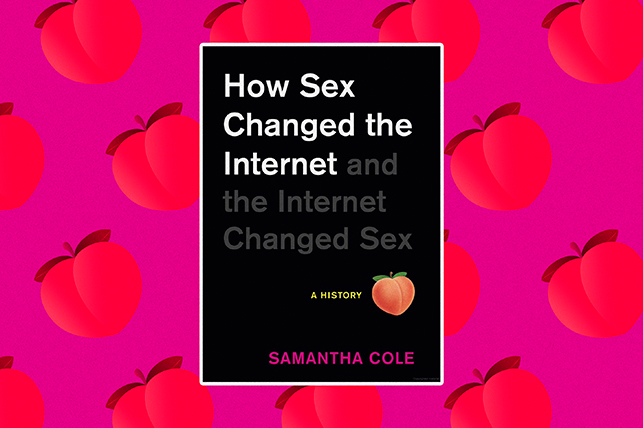Between the Pages: 'How Sex Changed the Internet' and Vice Versa

On March 11, 2023, author Samantha Cole spoke about her new book, "How Sex Changed the Internet and the Internet Changed Sex: An Unexpected History," to an audience at the South by Southwest festival in Austin, Texas.
Cole explained that almost every major development that defines the internet as we know it, from online payments and privacy issues to dating and social media, resulted from the meeting of sex and technology.
In the following highlights from her session about her new book, Cole discussed how sex influenced the internet and how the internet helped change modern sexuality. Topics covered include online dating, porn, deepfakes and more.
Editor's Note: These quotes have been edited for length and clarity.
On how the online sex industry led to technological innovation…
Cole: Much of the technology we use today was developed to build an internet devoted to sex and sex work. Things such as browser cookies and user tracking were developed and improved by online dating entrepreneurs and porn webmasters who wanted to keep track of who visited their sites so they could advertise more effectively. Affiliate marketing, which makes a lot of the internet run today, was popularized by porn sites that needed to make money from the thousands of people visiting their sites every day.
Webcams and web conferencing software were popularized by the earliest generations of cam models who set up sites to sell peeks into their bedrooms and their real lives. Live streamers who streamed their lives 24/7 paved the wave for things like Twitch and TikTok. Tech that was mostly used for sexual intrigue, which would be the live-streaming webcam we now use for business calls every day.
The founder of Web Personals, which was one of the very first online dating websites, claimed to have invented the shopping cart and the tech that gives webmasters the ability to track users from page to page within a website. Site subscriptions, members-only content, online credit card transactions, advertising models, the list goes on and on.
Online sex tech pioneers are still crafting new ways to express themselves and capitalize on the internet's insatiable desires.
On online dating…
In the 1960s, the company Operation Match was run by a group of college friends, and it was one of the first times computers were used to play matchmakers in the United States.
The true idea of online dating started with Matchmaker.com, which started as a BBS [bulletin board system] service. It actually started in Houston [Texas] and expanded into San Antonio. It then expanded again in 1987 and opened up for franchising, so anyone who wanted to set up a local clone of Matchmaker could.
Matchmaker.com hit the world wide web in 1998 and had 2 million members, which was a lot of people in 1998 for the internet. With 31,000 newbies joining every single week, it eventually grew to 4 million by 2000. The search engine company Lycos acquired Matchmaker.com in 2000 for $44.5 million.
The online dating boom that happened next into the 2000s proved that connections made virtually were no less powerful than ones in real life, and in some cases, could be even stronger. Sites like Match, eHarmony and Plenty of Fish entered the field. And between 2000 and 2010, 18 new dating sites were launched, most of them following the questionnaire model.
In the mid-aughts, the iPhone launched, which changed everything. Location-based mobile apps such as Grindr and Scruff paved the way for Tinder, Bumble and Hinge. In 2005, only 45 percent of people in the U.S. felt online dating was a good way to meet someone and more than a quarter felt that online dating was only for desperate people. Now, a majority of people don't feel strongly about online dating either way, which is perhaps a sign that internet-facilitated relationships are just part of life now.
On the negative aspects of sex and the internet…
Incels—short for involuntary celibate—are hateful people who find each other on online forums. They're usually angry, often violent, men who blame their rage on women's refusal to sleep with them. The ideologies fostered and spread on incel forums have inspired multiple mass murders in the last decade. Incels are radicalized online.
A deepfake is a video that's been algorithmically created using generative adversarial network circuits. These videos are made with machine learning algorithms using easily-accessible materials and open-source code. They first came out in 2007. You needed a data set of hundreds of high-quality source images, so you couldn't just do this with one selfie. Now you can do it with one photo and one video.
In late 2017, I was the first journalist to find and write about deepfakes. Deepfakes followed a long tradition of using image editing software to paste women's faces onto porn performers' bodies and still images.
Someone with the username Deepfakes on Reddit was taking his machine-learning skills a step further by making these images move, which blew the minds of the people in these photoshopping groups. He made [a video of] Gal Gadot waving a Fleshlight around. He made Taylor Swift sex tapes. And now his username is the word for any video face swap to look like someone else. We now use it for things like audio as well. Most of the deepfakes that exist on the internet today are not the fun face swap kind, but the abusive non-consensual kind.


















